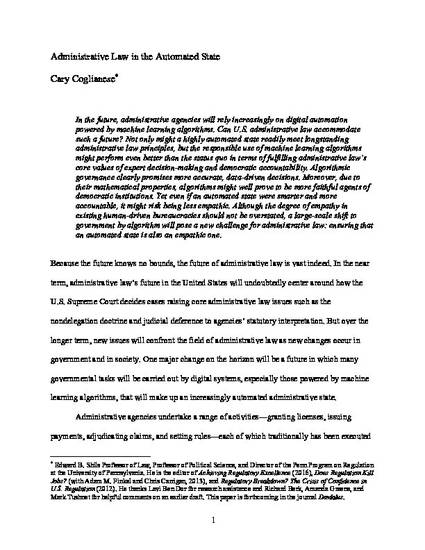
- Administrative Law,
- Anthropology,
- Artificial Intelligence and Robotics,
- Computer Engineering,
- Computer Law,
- Computer Sciences,
- Internet Law,
- Law,
- Law and Politics,
- Law and Society,
- Law Enforcement and Corrections,
- Operations Research, Systems Engineering and Industrial Engineering,
- Policy Design, Analysis, and Evaluation,
- Public Administration,
- Public Affairs, Public Policy and Public Administration,
- Public Law and Legal Theory,
- Robotics,
- Science and Technology Law,
- Social and Cultural Anthropology,
- Social Control, Law, Crime, and Deviance,
- Sociology and
- Systems Engineering
In the future, administrative agencies will rely increasingly on digital automation powered by machine learning algorithms. Can U.S. administrative law accommodate such a future? Not only might a highly automated state readily meet longstanding administrative law principles, but the responsible use of machine learning algorithms might perform even better than the status quo in terms of fulfilling administrative law’s core values of expert decision-making and democratic accountability. Algorithmic governance clearly promises more accurate, data-driven decisions. Moreover, due to their mathematical properties, algorithms might well prove to be more faithful agents of democratic institutions. Yet even if an automated state were smarter and more accountable, it might risk being less empathic. Although the degree of empathy in existing human-driven bureaucracies should not be overstated, a large-scale shift to government by algorithm will pose a new challenge for administrative law: ensuring that an automated state is also an empathic one.
- Administrative law,
- regulation,
- algorithmic governance,
- accuracy,
- autonomous systems,
- automation,
- artificial intelligence,
- AI,
- machine learning algorithms,
- big data,
- predictive analytics,
- decision-making,
- adjudicating by algorithm,
- rulemaking by robot,
- e-government,
- digital government,
- bias,
- empathy

© 2021 by the American Academy of Arts & Sciences Published under a Creative Commons Attribution- NonCommercial 4.0 International (CC BY-NC 4.0) license